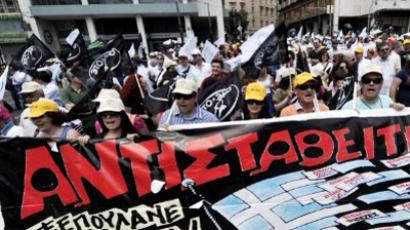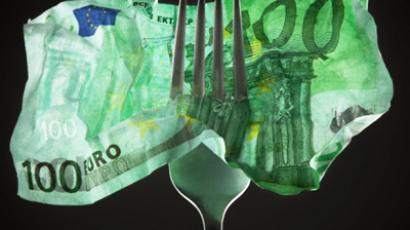Euro is political prison for Greece – MEP

If the reshuffled Greek government fails to win a vote of confidence in a parliamentary vote Tuesday, the implications for the euro will be grave, says MEP David Campbell Bannerman, but otherwise Greece’s economy will not have a chance to recover.
The Greek Parliament is conducting the last day of a debate that started on Sunday and is set to culminate late tonight with a vote of confidence on Prime Minister George Papandreou’s new government. If it gains parliamentary approval, the government will have to tackle the unpopular task of implementing further budget cuts coordinated with the EU and IMF. Papandreou, addressing the Parliament on Sunday, said the country’s financial reserves would soon be depleted. The monetary crisis was set in motion by EU financial ministers refusing to release a new 12-billion-euro tranche of loans. The ministers, meeting in Luxembourg on Monday, declared that a final decision on the tranche would be taken in July. They gave Greece two weeks to force through tax hikes and spending cuts. The discussion of a second bail-out for Greece was also postponed until the July session in Brussels. If the no-confidence vote goes through, there will presumably be an election and the implications for the euro will be very serious, believes MEP David Campbell Bannerman from the UK Conservative Party.The main concern if Greece defaults is that private investors may be hit badly, and may reconsider bailing out other troubled countries, such as Portugal, Ireland or Spain, says the MEP. “The question now is: Are we throwing good money after bad money? How many billions can we throw into this?” asks Bannerman. “I think this is major trouble for the euro. It will collapse in part or totally, and probably quite soon.”“The euro is a political prison for countries such as Greece and Spain,” added the MEP. “They need to be liberated from that prison, re-create their own currencies, have devaluation, make their exports cheaper and easier for tourists to visit their countries – and they will get back on their feet. I think the euro is very undesirable for a lot of these countries.” The Greek government has a clear majority and no surprises are expected in the vote of no-confidence, says Simos Kedikoglou, a member of the Greek Parliament.“We are voting against the continuation of the current policy,” said Kedikoglou, who represents the New Democratic Party. “These austerity measures have brought such results to the Greek economy that now everything is practically dead. We need development.”The New Democratic Party has offered to form a coalition government with the Socialistic Party, according to the MP, but this offer was turned down by the Socialists. The stagnant economy is neither beneficial to Greece nor to its partners, as most of the country’s obligations are held by German, French and American banks, says Kedikoglou. “You can see the desperation, the anger in the streets,” concluded Kedikoglou. “But the biggest deficit is not the economic one; it is a deficit of hope. This government is not oriented toward development, it just cuts down, cuts down and cuts down.”
Sotiris Panagiotis, a lecturer at the University of the Aegean, says that the Greek government has more than the confidence vote to worry about.“Even if the government manages to have the confidence vote tonight, it is not clear that they can stand up to the pressure from the streets, especially during the two-day national strike when the new austerity package is discussed in Parliament," he said. "The problem is that we are being given a $12 billion lifeline, the biggest part of which is going to be used to repay the previous debt.”
If Greece defaults, it will have a domino effect – MEP
Portugal and Spain would also default on their debt obligations if Greece does, says Thijs Berman, a member of the European Parliament. Moreover, it will be a message to the markets that the eurozone countries are not ready to save Greece, suggests the Dutch Party MEP, and that could spell the end of the eurozone.Greece will have to be bailed out, and if it does not happen then the EU finance ministers are at fault, said Berman.“The ministers of finance of the eurozone did not show enough resolve and did not take the right and radical decision to help Greece out once and for good,” he declared. “They gave one portion under conditions and were constantly negotiating on the next phases. The Greek government and opposition are to blame, too. They should show national unity and understand the necessity of meeting the conditions that have been set by the IMF and eurozone.” According to Berman, the solution to the Greek crisis is raising taxes, which Greece has proved capable of doing. Last year Athens collected 39 percent of Greece’s GDP in taxes, which was 2 percent higher than the year before. This is hard but unavoidable, concluded the MEP.














